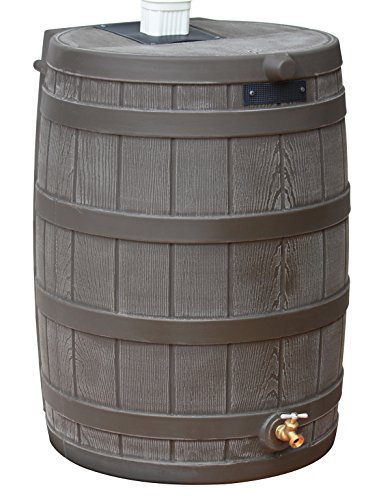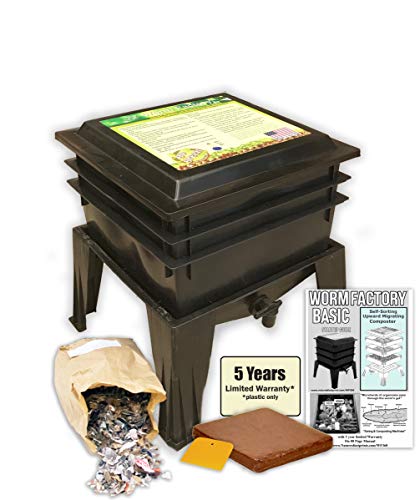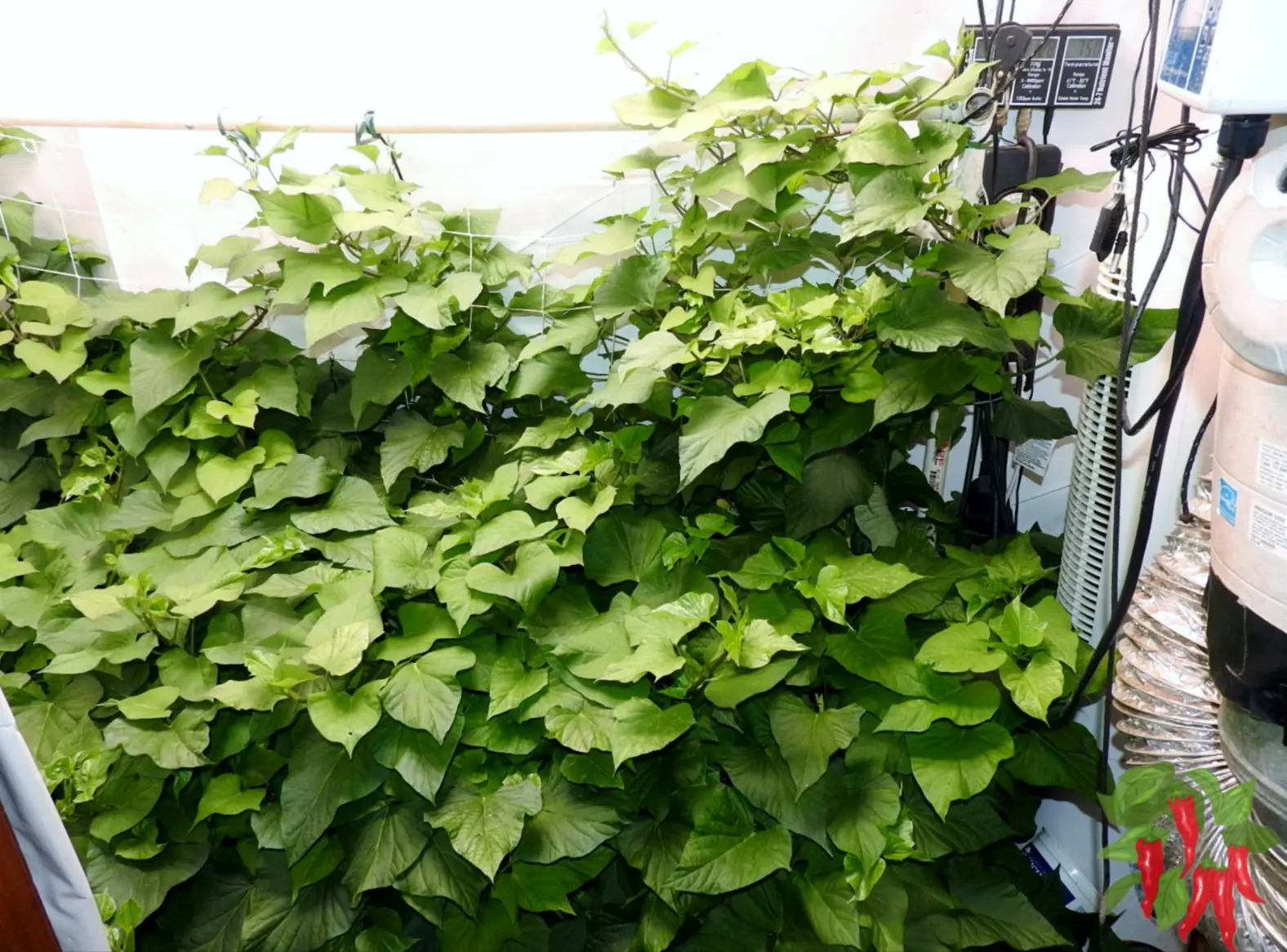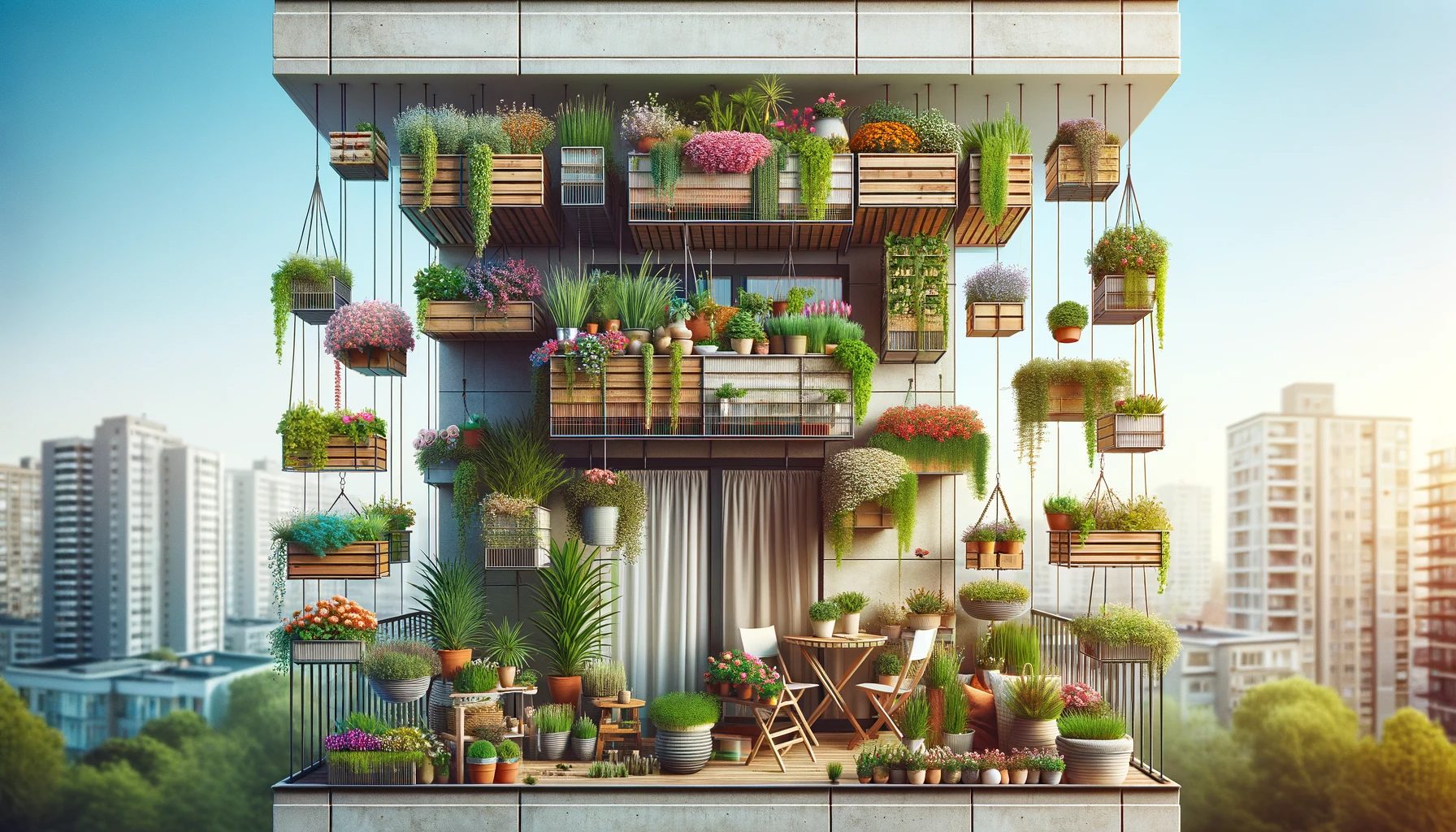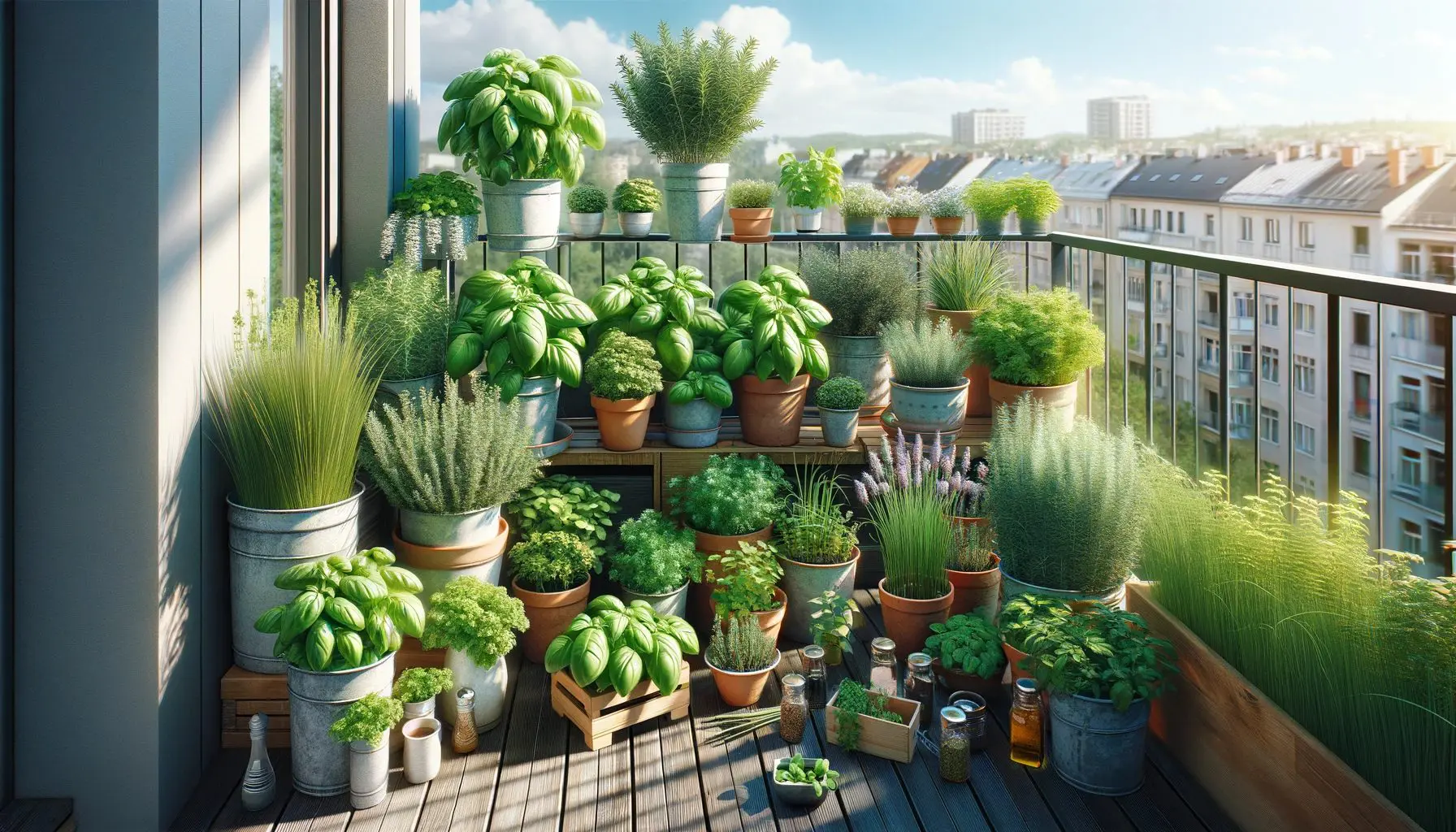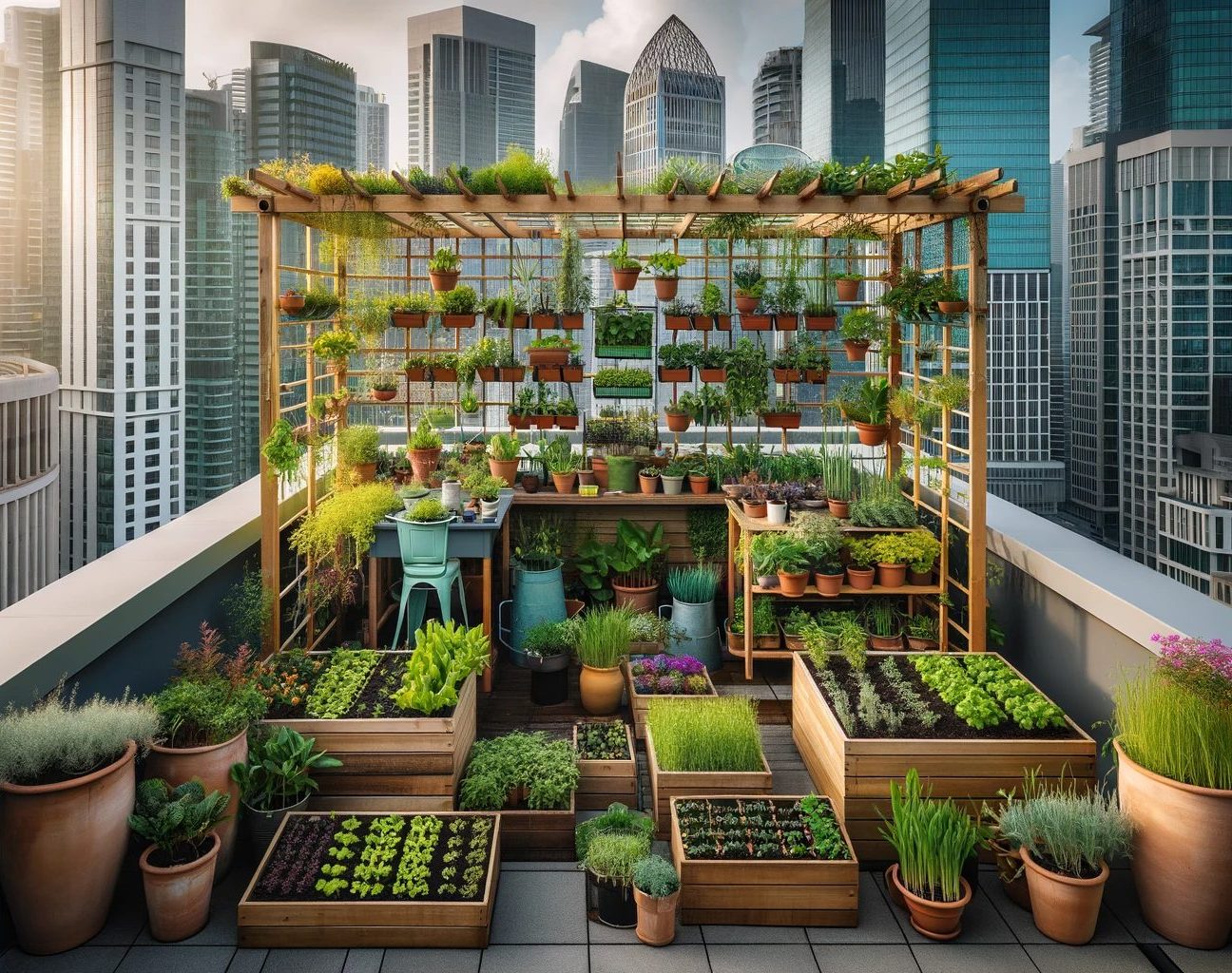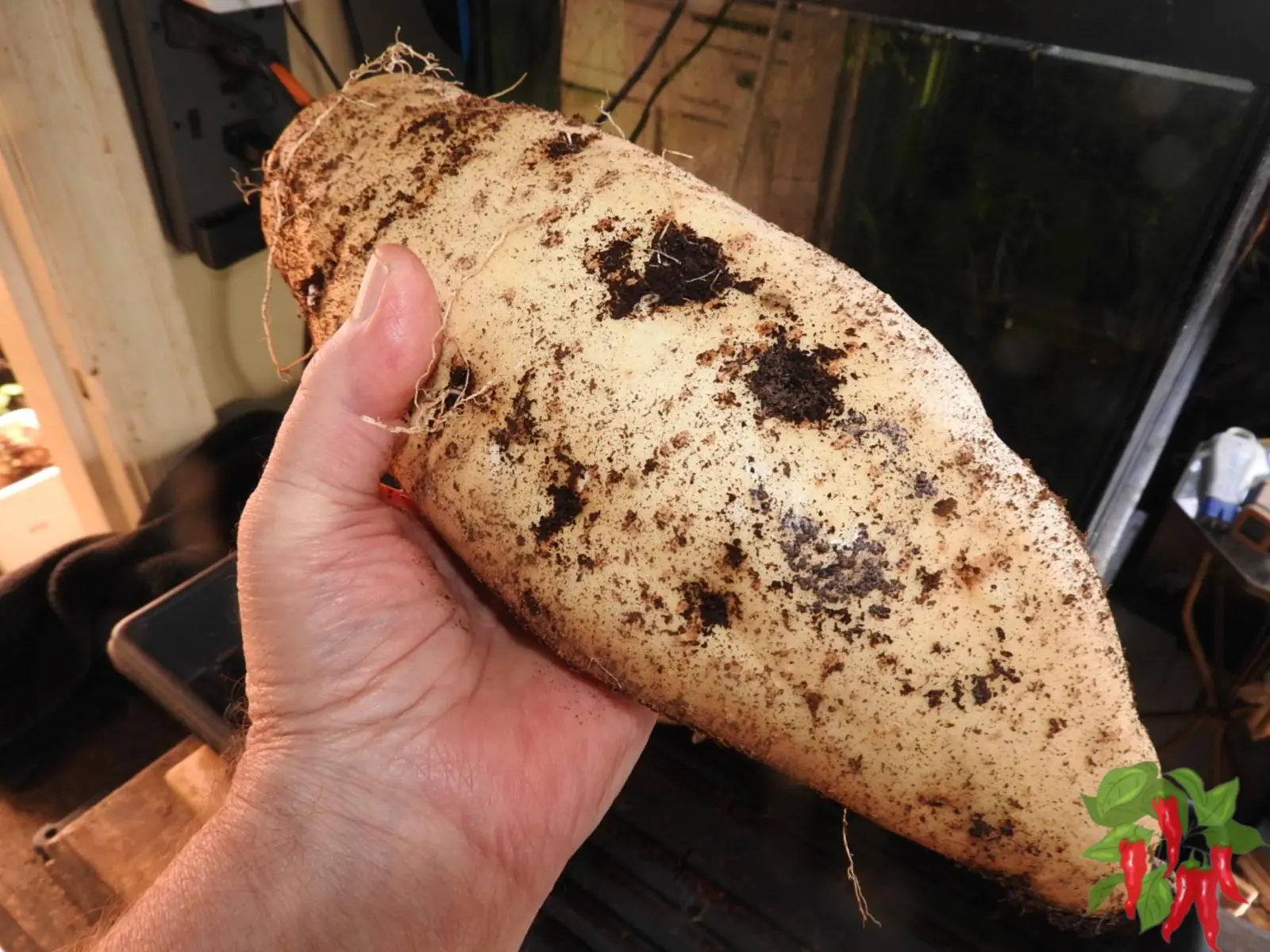This post contains affiliate links. If you buy something from one of our links we may earn a commission. Thanks
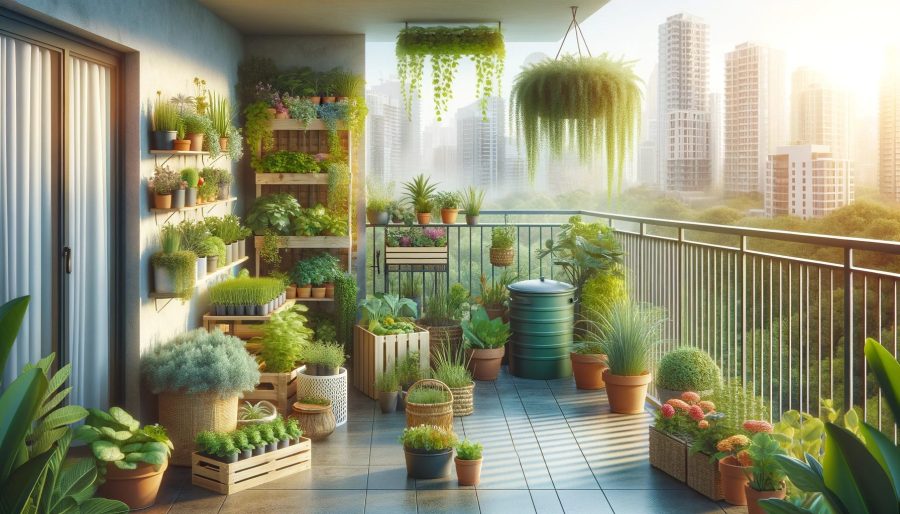
Dive into the world of sustainable balcony gardening! Discover eco-friendly tips and tricks to transform your balcony into a lush, green oasis.
Sustainable Balcony Gardening
Key Takeaways:
- Sustainable balcony gardening involves growing plants in a way that’s eco-friendly and resource-efficient.
- It includes using organic methods, conserving water, and promoting biodiversity, all while maximizing limited urban space for a positive environmental impact.
Welcome to the vibrant world of sustainable balcony gardening! It’s all about turning your little outdoor space into an eco-friendly paradise.
Whether you’ve got a green thumb or are just starting out, we’re here to guide you on this exciting journey to a greener balcony!
Introduction to Sustainable Balcony Gardening
In the midst of bustling city life, the concept of sustainable balcony gardening emerges as a beacon of hope for eco-conscious urban dwellers.
This innovative practice not only transforms your balcony into a lush, green oasis but also plays a pivotal role in promoting environmental stewardship right from your apartment.
Embracing sustainable gardening on your balcony isn’t just about adding a touch of nature to your urban space; it’s a profound commitment to reducing ecological footprints and nurturing a healthier planet.
Sustainable balcony gardening offers a gratifying way to connect with nature, enhance the quality of urban living, and contribute to a greener, more sustainable world.
The Growing Importance of Sustainable Gardening Practices
In recent years, the focus on sustainable gardening practices has intensified, marking a significant shift in how we interact with our immediate environment.
Sustainable Gardening vs Traditional Gardening
This change stems from a broader understanding of the impacts of traditional gardening on the ecosystem, including issues such as water wastage, soil degradation, and the harmful effects of chemical fertilizers and pesticides.
Sustainable gardening practices, such as the use of organic materials, conservation of resources, and promotion of biodiversity, offer solutions to these environmental challenges.
The significance of sustainable gardening is also magnified by the increasing need for urban green spaces.
Greening Up Cities
As city populations grow, so does the demand for gardens that not only beautify spaces but also contribute to ecological balance.
These practices are not just a trend but a crucial step toward mitigating the effects of urbanization and climate change.
By adopting sustainable methods, gardeners, whether on a small balcony or in a large backyard, can have a positive impact on the environment, supporting a healthier planet for future generations.
What is Sustainable Gardening and Why It Matters?
Sustainable gardening, or sustainable horticulture, is an approach that emphasizes the minimization of negative environmental impact while maximizing a garden’s health and productivity over the long term.
Mindful Decisions for a Sustainable Future
This practice involves a series of mindful decisions that collectively reduce ecological footprints.
It includes conserving natural resources, such as water and soil, promoting biodiversity by planting native species and reducing waste and pollution typically associated with gardening.
The Multifaceted Importance of Sustainable Gardening
The importance of sustainable gardening is multifaceted.
It ensures that our gardening practices contribute positively to the environment, conserving resources for future generations.
Furthermore, it enhances the local ecosystem, providing habitats for beneficial insects and wildlife.
Personal and Environmental Well-being
On a personal level, sustainable gardening can lead to healthier living spaces, with reduced exposure to harmful chemicals found in synthetic pesticides and fertilizers.
The practice is not only an environmentally responsible choice but also a deeply rewarding one, allowing gardeners to cultivate a space that nurtures both nature and their well-being.
Sustainable Balcony Gardening: A Path to Eco-Friendly Urban Living
Sustainable balcony gardening is a practical and increasingly popular way to bring sustainable practices into urban settings.
In cities where green space is limited, balconies offer a unique opportunity to contribute to environmental sustainability.
Even in a small space, a balcony garden can have a positive impact, from purifying the air to reducing the urban heat island effect.
Adapting Sustainable Horticulture to Balcony Spaces
This form of gardening adapts the principles of sustainable horticulture to the constraints of balcony spaces.
It involves practices like using water-efficient irrigation systems, such as drip irrigation or self-watering containers, and organic soil amendments.
Contributing to Urban Biodiversity
Balcony gardeners can also contribute to biodiversity by creating habitats for beneficial insects and pollinators through the use of native plant species.
Aligning with an Eco-Conscious Urban Lifestyle
Moreover, sustainable balcony gardening aligns with the growing desire for a more eco-conscious lifestyle among urban dwellers.
It’s a way to reconnect with nature, grow one’s own food, and reduce one’s carbon footprint, all from the confines of an apartment.
Embracing Small Steps for a Sustainable Future
It embodies the principle that every small step counts towards a larger environmental goal.
In embracing sustainable balcony gardening, individuals can make a significant contribution to a more sustainable urban future.
Key Sustainable Practices and Benefits
Sustainable Practices in Balcony Gardening and Embracing a Greener Philosophy
As we delve deeper into the realm of sustainable balcony gardening, it’s essential to recognize that this approach goes beyond mere gardening techniques.
It’s a philosophy that binds the health of our planet with our personal living spaces.
Core Practices of Sustainable Gardening
Essential Elements of Sustainable Balcony Gardening
The essence of sustainable gardening lies in adopting practices that are environmentally responsible and resource-efficient. This includes:
- Choosing the Right Plants: Select plants that are suited to your balcony’s microclimate. Native species are often more resilient and require less care. They also provide a familiar habitat for local wildlife.
- Soil Management: Use organic compost to enrich your soil. This not only improves soil health but also reduces the need for chemical fertilizers, which can be harmful to the environment.
- Water Efficiency: Employ water-saving techniques like drip irrigation and self-watering pots. These methods deliver water directly to the roots, reducing wastage.
Benefits Beyond the Balcony: Making Environmental Contributions
By practicing sustainable gardening, balcony gardeners make significant environmental contributions:
- Reducing Carbon Footprint: Plants absorb carbon dioxide, helping to mitigate urban air pollution.
- Supporting Biodiversity: A diverse range of plants attracts and supports various beneficial insects and birds, enhancing local biodiversity.
Personal Well-being
Sustainable balcony gardening also has profound personal benefits:
- Mental Health Benefits: Gardening is a therapeutic activity that can reduce stress and improve mental well-being.
- Physical Health Benefits: Growing your own vegetables and herbs ensures access to fresh, organic produce, promoting better nutrition.
Transforming Spaces into Green Havens
Water Conservation Techniques
- Rainwater Harvesting: Collect rainwater to water your plants, a simple yet effective way to conserve water.
- Mulching: Using organic mulch helps retain moisture in the soil, reducing the need for frequent watering.
Organic Soil Management
- Composting: Convert kitchen waste into nutrient-rich compost. This not only recycles organic waste but also provides a healthy growing medium for your plants.
- Avoiding Chemicals: Use natural fertilizers like compost tea or worm castings instead of synthetic ones.
Natural Pest Control
- Companion Planting: Certain plant combinations naturally repel pests. For example, marigolds can deter pests from tomatoes.
- Encouraging Beneficial Insects: Attract insects like ladybugs, which feed on common garden pests like aphids.
- Use Organic Pesticides like insecticidal soap or neem oil to control pests when necessary.
The Personal and Environmental Impact
Urban Ecosystem Contribution
Sustainable gardening practices contribute to creating a healthier urban ecosystem by:
- Improving Air Quality: Plants filter pollutants, providing cleaner air.
- Creating Microhabitats: Even a small balcony garden can serve as a vital habitat for urban wildlife.
Enhancing Personal Well-being
- Educational Value: Gardening provides a hands-on opportunity to learn about nature and sustainability.
- Sense of Achievement: Growing and caring for plants offers a unique sense of accomplishment and connection to the natural world.
In conclusion, sustainable balcony gardening is a multifaceted approach that benefits both the environment and the gardener.
By adopting these core practices, you can transform your balcony into a green haven that contributes to urban sustainability and enhances your personal well-being.
Environmental Benefits of Sustainable Balcony Gardening
Reducing the Ecological Footprint
Sustainable balcony gardening is pivotal in reducing the ecological footprint of urban living.
By implementing eco-friendly practices, balcony gardeners play a crucial role in conserving resources and fostering biodiversity.
This approach helps mitigate the urban heat island effect, improves air quality, and creates a small yet significant habitat for local wildlife.
Enhancing Urban Biodiversity
Balcony gardens are not just aesthetic enhancements; they’re vital in promoting urban biodiversity.
Planting a variety of native species attracts beneficial insects, birds, and pollinators, contributing to ecological balance in densely populated areas.
Water Conservation Techniques
Efficient Irrigation Systems
One of the key aspects of sustainable gardening is water conservation.
Implementing efficient irrigation systems like drip irrigation or self-watering containers ensures that water is used judiciously, reducing wastage and ensuring that plants receive the right amount of hydration.
Rainwater Harvesting
Collecting and utilizing rainwater for gardening purposes significantly reduces the dependency on municipal water supplies.
This practice is not only sustainable but also encourages a more mindful approach to resource utilization.
Soil Health and Fertilization Methods
Organic Soil Amendments
Maintaining soil health is crucial in sustainable gardening.
Incorporating organic matter like compost or worm castings improves soil fertility and structure, promoting healthier plant growth and reducing the need for chemical fertilizers.
Emphasizing Natural Fertilizers
The use of slow-release organic fertilizers provides plants with the necessary nutrients over time, enhancing growth without the adverse environmental impact associated with synthetic fertilizers.
Health Benefits of an Eco-friendly Balcony Garden
Safe Living Environments
Sustainable balcony gardens contribute to safer living environments.
By avoiding synthetic chemicals and pesticides, these gardens minimize exposure to harmful substances, ensuring a healthier living space for residents.
Psychological Well-being
The presence of a green space, even as small as a balcony garden, has been shown to have significant psychological benefits.
It reduces stress, enhances mood, and provides a sense of well-being, contributing to overall mental health.
Nutritious, Chemical-Free Food
Access to Fresh Produce
Growing your own fruits, vegetables, and herbs on a balcony garden ensures access to fresh, chemical-free produce.
This not only contributes to a healthier diet but also reduces the carbon footprint associated with transporting food.
Promoting Organic Gardening
By adopting sustainable practices, balcony gardeners can enjoy nutritious food free from harmful pesticides and fertilizers, promoting a healthier lifestyle and contributing to the well-being of the environment.
In summary, sustainable balcony gardening offers a plethora of benefits that extend beyond mere aesthetics.
It fosters environmental responsibility, conserves vital resources, enhances soil health, and contributes to the physical and mental well-being of urban dwellers.
By embracing these practices, balcony gardeners can make a meaningful impact on both their environment and their health.
Sustainable Gardening Techniques for Balcony Gardeners
Dive into sustainable gardening techniques for balcony gardeners and discover how to turn your urban space green.
This guide offers practical, eco-friendly methods to nurture a thriving garden on your balcony.
Embrace vertical gardening, water conservation, and organic practices to create a sustainable oasis right in your urban home.
Sustainable Gardening Techniques for Balcony Gardeners
Embracing Eco-Friendly Gardening
Embarking on the journey of sustainable balcony gardening means embracing a range of eco-friendly techniques.
This introduction sets the stage for exploring innovative methods that not only beautify but also eco-optimize your balcony space.
Tailoring Techniques for Small Spaces
Balcony gardening presents unique challenges due to space limitations.
We will delve into how these challenges can be turned into opportunities through creative and sustainable gardening techniques.
The Goal: Maximizing Potential, Minimizing Impact
The primary goal of these techniques is to maximize the potential of your limited balcony space while minimizing environmental impact.
From water conservation to waste reduction, each method contributes to a more sustainable way of living.
A Guide for Every Urban Gardener
Whether you’re an experienced gardener or a beginner, this guide offers valuable insights and practical tips for everyone.
It’s about making each square inch of your balcony count, both for your personal enjoyment and the health of our planet.
In this section, we delve into a variety of sustainable gardening techniques, each designed to help you transform your balcony into a flourishing, eco-friendly garden.
These methods are tailored to work with limited space and resources, ensuring that even the smallest balcony can become a vibrant green oasis.
Vertical Gardening: Maximizing Space
- Utilize Vertical Space: Learn how to use wall-mounted planters, hanging baskets, and trellises to grow upwards, making the most of limited space.
- DIY Vertical Structures: Get creative with DIY solutions like pallet planters or repurposed shelving units for an efficient and personalized vertical garden.
Water Conservation: Smart Irrigation
- Drip Irrigation Systems: Discover how to install simple drip irrigation systems for efficient water use.
- Self-Watering Containers: Find out how self-watering pots can conserve water and reduce the need for daily watering.
Organic Soil Management: Nourishing Your Plants
- Composting: Learn to create your compost from kitchen scraps, providing nutrient-rich soil for your plants.
- Choosing Organic Fertilizers: Understand the benefits of using organic fertilizers over chemical ones and how to apply them effectively.
Natural Pest Control: Eco-Friendly Solutions:
Companion Planting: Strategic Plant Partnerships
- Marigolds and Tomatoes: Planting marigolds near tomatoes can repel aphids and other pests, thanks to marigolds’ natural repellent properties.
- Basil and Leafy Greens: Growing basil alongside leafy greens like lettuce or spinach can help ward off flies and mosquitoes, enhancing the health of your greens.
- Chives and Roses: Chives can help prevent aphid infestations on roses, making them an excellent companion for rose bushes on your balcony.
Homemade Pesticides: Natural Solutions for Pest Control
- Neem Oil Spray: Mix neem oil with water and a mild detergent for an effective all-purpose pest repellent. It’s particularly good for combating aphids, mites, and scale insects.
- Garlic Spray: Blend a few cloves of garlic with water and a small amount of dish soap to create a potent garlic spray. It’s effective against a wide range of pests and can deter small critters.
- Chili Pepper Spray: Steep chili peppers in hot water, then strain and mix with a few drops of dish soap. This spicy mixture can deter many insects and is especially useful for keeping leaf-chewing pests at bay.
By incorporating these specific companion planting strategies and homemade pesticide recipes into your balcony gardening practices, you can naturally protect your plants from pests, reducing the need for chemical pesticides and fostering a healthier, more sustainable garden environment.
Plant Selection: Choosing the Right Greenery
Suitable Plants for Balcony Gardens: Thriving in Limited Spaces
- Herbs: Herbs like basil, mint, cilantro, and thyme are perfect for balconies. They require minimal space and can be grown in small pots or containers. They need ample sunlight and regular watering.
- Tomatoes: Cherry or grape tomatoes are ideal for balcony gardens. They can be grown in hanging baskets or pots with support structures for the vines. They thrive in full sun and need consistent watering.
- Lettuce and Leafy Greens: Varieties of lettuce, spinach, and kale are suitable for balcony gardens. They prefer cooler temperatures and partial sun. Keeping the soil consistently moist is key for their growth.
Native Plant Species: Enhancing Local Ecosystems
- Importance of Native Plants: Native plants are adapted to the local climate and soil conditions, making them easier to maintain. They require less water and are more resistant to local pests and diseases.
- Examples of Native Plants:
- For Cooler Climates: Plants like Coneflowers, Black-Eyed Susans, and local fern species can thrive.
- For Warmer Climates: Consider plants like Lantana, Coral Bells, or local wildflower varieties.
- Benefits for Biodiversity: Native plants support local wildlife, including pollinators like bees and butterflies, which are crucial for maintaining healthy ecosystems.
Incorporating these suitable plants and native species into your balcony garden not only ensures a vibrant and flourishing garden but also contributes to the ecological health of your urban environment.
By choosing plants that are well-suited to balcony conditions and focusing on native species, you can enjoy a low-maintenance, sustainable, and ecologically beneficial garden space.
Sustainable Materials: Eco-Friendly Choices
- Recycled Planters: Repurpose common household items into planters, reducing waste.
- Sustainable Gardening Tools: Look for used eco-friendly gardening tools and resources that lessen your environmental impact.
By mastering these sustainable gardening techniques, you’ll not only beautify your balcony but also contribute to a healthier environment, enjoying the satisfaction and tranquility that comes with nurturing a green space in the heart of the city.
Enhancing Your Balcony’s Eco-Friendliness
Discover how to enhance your balcony’s eco-friendliness in this guide, designed for urban spaces of all sizes.
Learn simple yet impactful ways to make your balcony garden sustainable, benefitting both the planet and your well-being.
Transform your outdoor space into a green sanctuary with eco-friendly practices.
The Green Transformation
As we explore the realm of sustainable balcony gardening, a critical aspect emerges – enhancing the eco-friendliness of your balcony space.
This introduction paves the way for understanding how simple, yet impactful changes can transform your balcony into a more sustainable and environmentally friendly area.
Small Spaces, Big Impact
Maximizing Balcony Potential
Even the smallest balconies have the potential to contribute significantly to the environment. Here’s how:
- Vertical Gardening: Utilize vertical space by installing wall planters or trellises. This technique not only saves space but also creates more area for plants, increasing your balcony’s green footprint.
- Container Gardening: Use containers of various sizes to grow a variety of plants. Containers can be moved around to make the most of sunlight and space.
Ecological Contributions
Small balcony gardens can make notable ecological contributions:
- Microclimate Regulation: Plants on your balcony can help regulate temperature, reducing the urban heat island effect.
- Air Purification: Plants absorb carbon dioxide and other pollutants, improving air quality around your home.
Sustainable Practices for Urban Gardeners:
Selecting Eco-Friendly Plants
- Native Species: Choose native plants as they are adapted to local conditions and support local wildlife. They usually require less water and are more resistant to pests.
- Edible Plants: Grow herbs, vegetables, and fruit-bearing plants. This not only provides fresh produce but also reduces the carbon footprint associated with food transport.
Eco-Conscious Materials and Techniques
- Recycled and Biodegradable Pots: Opt for pots made from recycled materials or biodegradable planters. This reduces plastic waste and promotes a sustainable gardening cycle.
- Organic Pest Control: Use natural methods for pest control, like neem oil or homemade insecticidal soaps, avoiding harmful chemicals.
Water Conservation
- Drip Irrigation Systems: These systems deliver water directly to the plant roots, reducing water wastage.
- Watering at Optimal Times: Water plants early in the morning or late in the evening to minimize evaporation.
Soil Health
- Organic Compost: Make your compost from kitchen scraps and garden waste. This not only enriches the soil but also reduces household waste.
- Add a Worm Bin Worm bins are compact and odorless and will turn your kitchen scraps into rich worm castings for fertilizing.
- Mulching: Apply organic mulch to retain moisture and suppress weeds, reducing the need for frequent watering and herbicides.
By implementing these practices, urban gardeners can turn their small balcony spaces into impactful, sustainable ecosystems. Every little effort counts towards creating a greener, more biodiverse urban environment.
A Journey Towards a Greener Future
Embarking on this journey is about more than gardening; it’s a commitment to a greener, more sustainable future.
By enhancing the eco-friendliness of your balcony, you’re taking a step towards a more responsible and environmentally conscious lifestyle.
As we dive into this section, keep in mind that every small step towards eco-friendliness contributes to a larger global effort to preserve our environment.
Let’s discover how to make your balcony garden not just a space for relaxation and beauty, but a symbol of sustainable living.
Attracting Pollinators and Promoting Biodiversity
Creating Habitats for Pollinators
Attracting pollinators such as bees, butterflies, and hummingbirds to your balcony garden is vital for promoting biodiversity.
Incorporating native flowering plants that offer nectar and pollen throughout different seasons is a key strategy.
Providing water sources like shallow dishes or small water features also encourages these beneficial visitors.
Benefits of Biodiversity
A diverse balcony garden not only supports local ecosystems but also ensures a more resilient and vibrant plant life.
Pollinators are essential for the cross-pollination of many plants, leading to healthier growth and a more fruitful yield.
Sustainable Furnishing and Decoration Options:
Eco-Friendly Materials
Choosing sustainable materials for your balcony furniture and decorations is crucial.
Opt for natural materials like terracotta pots, wood, bamboo, jute, and seagrass, or recyclable metals.
These materials are not only environmentally friendly but also add a natural aesthetic to your balcony space.
Upcycling for Unique Decor
Embrace upcycling by transforming old items into creative planters or decorative pieces.
This approach not only reduces waste but also gives your balcony a unique and personalized touch.
Implementing Sustainable Energy Solutions on Your Balcony
Solar Energy Utilization
Consider installing solar panels on your balcony to harness renewable energy.
Even a single panel can contribute significantly to your apartment’s energy needs, reducing your carbon footprint and energy costs.
Energy-Efficient Lighting
Switch to LED lighting for your balcony. LEDs are much more energy-efficient than traditional bulbs, saving energy and reducing electricity bills.
Insulating Windows for Energy Efficiency
Enhancing Thermal Efficiency
Proper insulation of balcony doors and windows plays a significant role in energy conservation.
By insulating these areas, especially in colder months, you can significantly improve your home’s thermal efficiency, reducing the need for excessive heating.
Eco-Friendly Insulation Options
Explore eco-friendly options for window insulation, such as thermal curtains or weatherstripping.
These solutions not only aid in maintaining a comfortable indoor temperature but also contribute to overall energy efficiency.
In summary, enhancing your balcony’s eco-friendliness involves a holistic approach that includes attracting pollinators, choosing sustainable furnishings, implementing energy-efficient solutions, and ensuring proper insulation.
Each of these elements contributes to creating a more sustainable and environmentally responsible balcony garden.
FAQs on Sustainable Balcony Gardening
Navigating the world of sustainable balcony gardening can bring up numerous questions, especially for those new to this eco-friendly pursuit.
In this FAQs section, we aim to address some of the most common inquiries, providing clear and concise answers to help you on your journey towards creating a thriving, sustainable balcony garden.
Whether it’s about starting out, choosing the right plants, or implementing sustainable practices, these FAQs are designed to guide and inform both novice and experienced gardeners alike.
Q: How can I start a sustainable garden in a small balcony space?
A: Starting a sustainable garden in a small balcony space involves:
- Maximizing your available area with vertical gardening, choosing plants suitable for your climate and space
- Using eco-friendly containers, and implementing water-efficient irrigation techniques.
- Remember, even a few plants can make a significant environmental impact.
Q: What are the best plants for attracting pollinators to my balcony garden?
A: The best plants for attracting pollinators are native flowering species that provide nectar and pollen.
Consider plants like lavender, daisies, and herbs such as basil and thyme.
These not only attract bees and butterflies but also add beauty and fragrance to your space.
Q: Can I implement sustainable practices if I’m new to gardening?
A: Absolutely! Sustainable practices are suitable for gardeners at all levels.
Start with simple steps like using organic soil, composting kitchen scraps, collecting rainwater for irrigation, and choosing natural pest control methods.
These practices are easy to adopt and make a significant difference.
Q: Is it possible to grow vegetables on a balcony?
A: Yes, it is possible to grow vegetables on a balcony.
Choose compact varieties or plants that can be grown in containers, such as tomatoes, peppers, leafy greens, and herbs.
Ensure they receive adequate sunlight and water, and use quality organic soil for the best results.
Q: How can I conserve water in my balcony garden?
A: Conserve water by using self-watering containers, drip irrigation systems, and by collecting and using rainwater.
Also, grouping plants with similar water needs and mulching can help retain soil moisture and reduce the frequency of watering.
Q: What are some eco-friendly materials I can use for balcony gardening?
A: For eco-friendly gardening, use materials like terracotta, natural wood or bamboo for planters and furniture.
Recycled containers, biodegradable pots, and upcycled items are also great choices.
Avoid plastics and non-recyclable materials whenever possible.
By addressing these FAQs, we hope to empower you with the knowledge and confidence to create and maintain a sustainable balcony garden that is not only a source of joy and relaxation but also a contributor to a greener, more sustainable world.
Conclusion: Embracing Sustainable Practices for a Greener Tomorrow
Reflecting on the Sustainable Gardening Journey
As we conclude our exploration of sustainable balcony gardening, it’s essential to reflect on the journey we’ve undertaken.
From understanding the basics of sustainable gardening to implementing specific techniques and embracing eco-friendly practices, each step has been a stride towards a greener and more sustainable future.
The Impact of Individual Efforts
The journey through sustainable balcony gardening underscores a powerful message: individual efforts, no matter how small, can collectively make a significant impact.
Each balcony garden becomes a testament to environmental stewardship, contributing positively to the urban landscape and the broader ecosystem.
Sustainable Gardening as a Lifestyle
Sustainable balcony gardening is more than just a hobby; it’s a lifestyle choice that aligns with the growing global consciousness about environmental preservation.
By adopting these practices, balcony gardeners not only enhance their living spaces but also contribute to the health and well-being of the planet.
The Ripple Effect of Sustainable Choices
The choices made in balcony gardening ripple outwards, inspiring communities and influencing urban environmental policies.
These gardens serve as beacons of sustainability, showcasing how urban spaces can be transformed into lush, productive, and eco-friendly environments.
A Call to Action
As we move forward, let this exploration serve as a call to action. Embrace sustainable gardening practices in your balcony garden and encourage others to do the same.
Together, we can cultivate a greener, more sustainable tomorrow, one balcony garden at a time.
In embracing these sustainable practices, each balcony gardener becomes a part of a larger movement toward environmental responsibility and ecological balance.
Let’s continue to nurture our green spaces, foster biodiversity, and make sustainability a cornerstone of our urban living.



